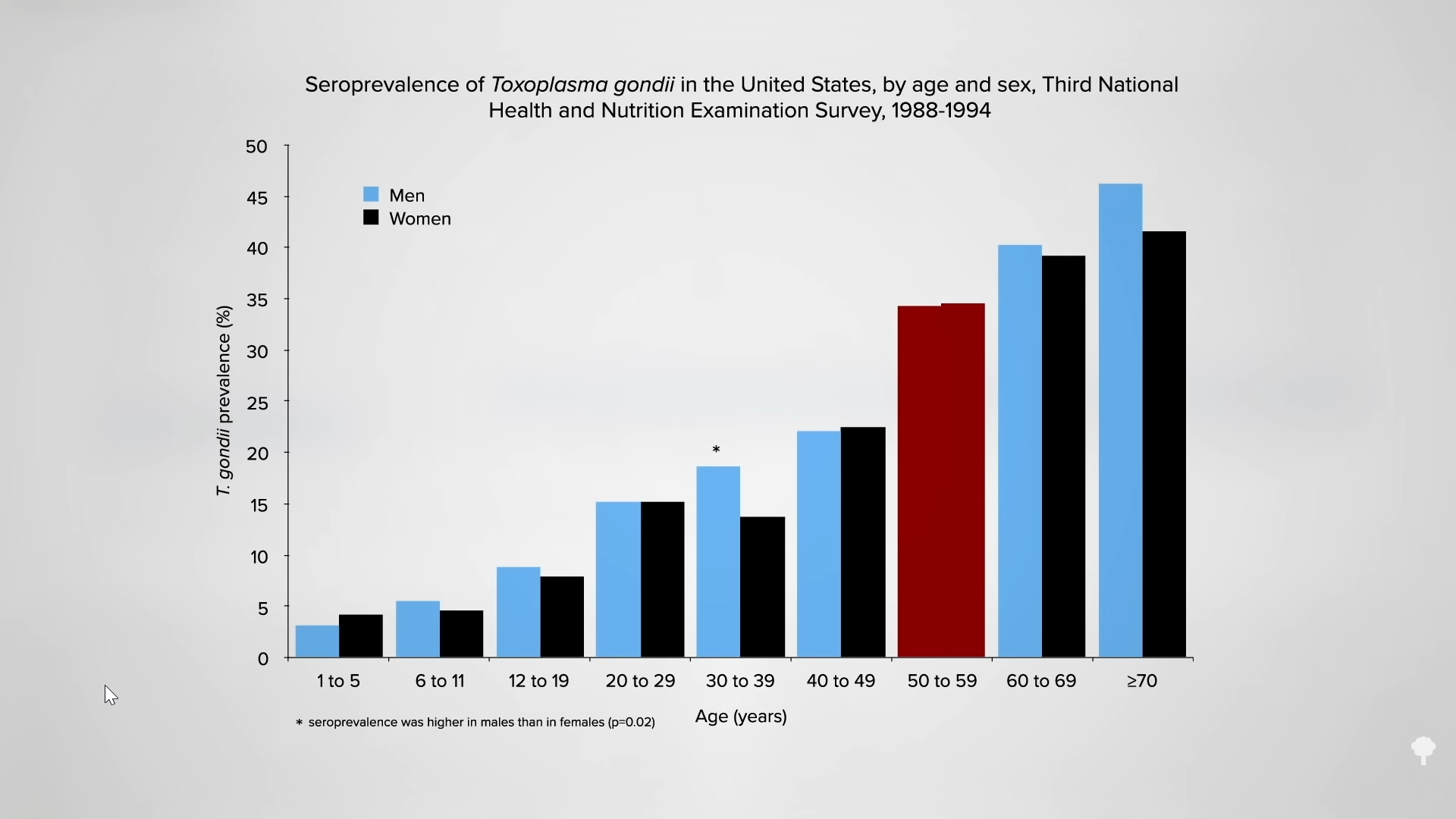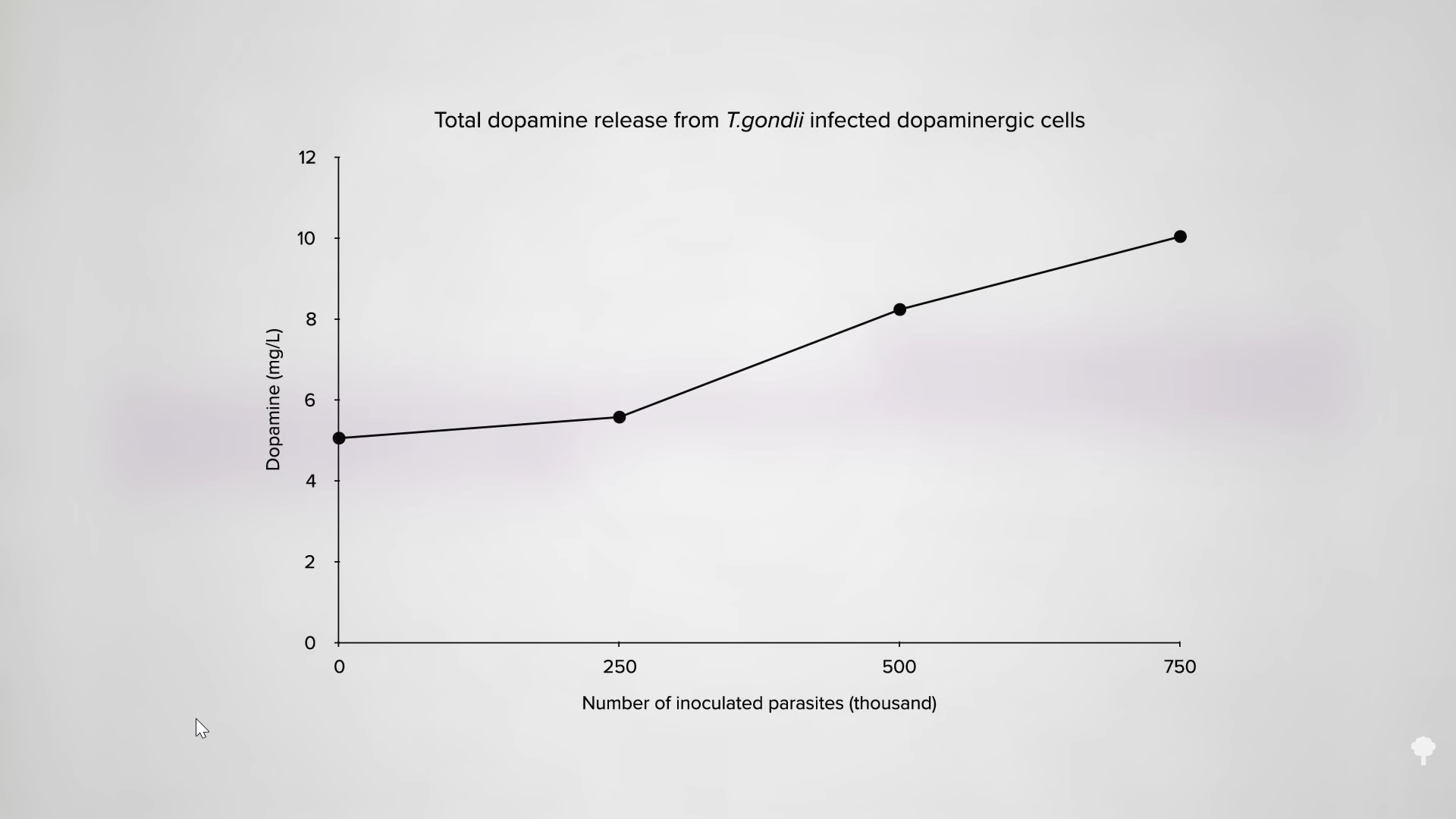[ad_1]
Toxoplasma mind parasites could cause persona alterations.
Of all causes of foodborne illness, a mind parasite known as toxoplasma is ranked because the fourth main reason for hospitalization and the second main reason for demise in america. Practically 1 / 4 of us have already been contaminated, one in three of us by the point we hit our 50s, as you may see within the graph under and at 0:22 in my video Lengthy-Time period Results of Toxoplasmosis Mind An infection.

Though we might then be caught with this parasite in our mind for all times, our immune system is so good at preserving it at bay that, for many wholesome folks, it’s by no means capable of rear its ugly head—or at the least not overtly. Research have proven associations between toxoplasma an infection and the presence of assorted psychiatric problems, akin to schizophrenia, bipolar, suicide, self-harm, and reminiscence impairment after we become old. How can a tiny parasite alter our very habits?
I’ve talked earlier than about how the rabies virus waits within the saliva whereas particularly concentrating on the feelings middle of the mind to drive animals right into a fury, so that they’ll successfully do its bidding to chunk others to transmit the virus. And there’s the well-known zombie-ant mind fungus that takes over the animal utterly. These are examples of “parasitic manipulation,” the place the parasite manipulates the host to “improve its personal transmission by altering host behaviour.” Toxoplasma is “maybe one of the crucial convincing examples of a manipulative parasite of vertebrates,” larger animals, like us.
For the reason that parasite thrives in cats, “chronically contaminated rodents now not reply to cat odour with worry and certainly the bodily response is reversed to attraction.” Mice turn into interested in the odor of cats and thereby serve up the parasite on a silver platter. The parasite manipulates the rodent’s mind, “turning their innate aversion right into a ‘suicidal’ ‘deadly feline attraction.’” Mice turn into interested in cat pee, and this deadly attraction seems particular in direction of cats. They don’t turn into interested in pee basically; they continue to be detached to rabbit pee, as an example, and proceed to be turned off by the pee of different predators. So, on one hand, the parasitic manipulation seems to be extremely particular, however the parasite doesn’t simply need the mouse to hunt out the cat. It needs the mouse to get eaten. So, there are common results, too, akin to impaired motor operate, slower response instances, and impaired reminiscence and coordination. When the cat pounces, the parasite tries to ensure the mouse doesn’t get away. Equally, when California sea otters get contaminated with toxoplasma, they’re extra prone to get eaten by a shark. It’s not that the parasite needs to get into the shark; it could simply be a by-product of the form of common cognitive deficits which can be so useful for the parasite in different contexts.
When people get contaminated, we additionally begin liking the odor of cat pee. Isn’t that wild? The parasite is aware of simply what strings to drag, but it surely’s the extra common results we’re involved about. We don’t want to fret that our newfound appreciation for saber-toothed tiger urine goes to get us eaten, however mucking with our response instances might be problematic. That might be why a number of research have proven extra visitors and worksite accidents amongst those that are chronically contaminated. It might not simply be our slowed response time, although. The parasite additionally seems to have an effect on “refined behavioural alterations,” like making us extra prone to take dangers. Nice for the parasite within the cat-and-mouse recreation, however not a lot if we’re driving a automobile or questioning whether or not or to not take that subsequent drink. Perhaps one cause folks with this mind parasite get into so many automobile accidents is that it could make folks interact in riskier behaviors, like extreme alcohol consumption.
We sometimes assume of malaria as being humanity’s biggest killer parasite. “Nonetheless, after we take note of the a whole lot of 1000’s of deaths that happen as a result of elevated likelihood of visitors accidents, working accidents, suicides, and probably additionally different unintended effects of the an infection, we’re compelled to confess that ‘asymptomatic’ latent toxoplasmosis”—that’s, toxoplasma an infection that has contaminated one in 4 People—“might simply take malaria down from its throne.” Earlier than I get into methods to stop and deal with the darn factor, what would possibly these “different unintended effects” be?
How precisely does toxoplasma manipulate its host’s habits? Nicely, one clue we obtained many years in the past is the elevated stage of dopamine within the brains of contaminated mice. You’ll be able to even present it proper in a petri dish of contaminated mind tissue, as you may see within the graph under and at 4:28 in my video. It seems that these parasites really have an enzyme to make dopamine from scratch, which they then launch into the encompassing mind tissue. Why can we care? As a result of elevated dopamine is a attribute of schizophrenia. Practically all trendy antipsychotic medication work by making an attempt to carry down dopamine ranges by both inhibiting dopamine receptors or lowering the extent of dopamine within the mind.

Researchers posited that “[i]t is feasible that the elevated dopamine accumulation and launch noticed throughout T. gondii [toxoplasma] an infection might contribute to… schizophrenia.” That must be simple to determine. Do schizophrenics have an elevated prevalence of an infection? Certainly, the “elevated prevalence of toxoplasmosis in schizophrenics was demonstrated by at the least 50 research…”
Bear in mind: Power an infection shouldn’t be uncommon. Practically one in 4 American adults and adolescents are already contaminated. If that surprises you, you could have missed the opposite movies in my four-part sequence:
[ad_2]







































Discussion about this post